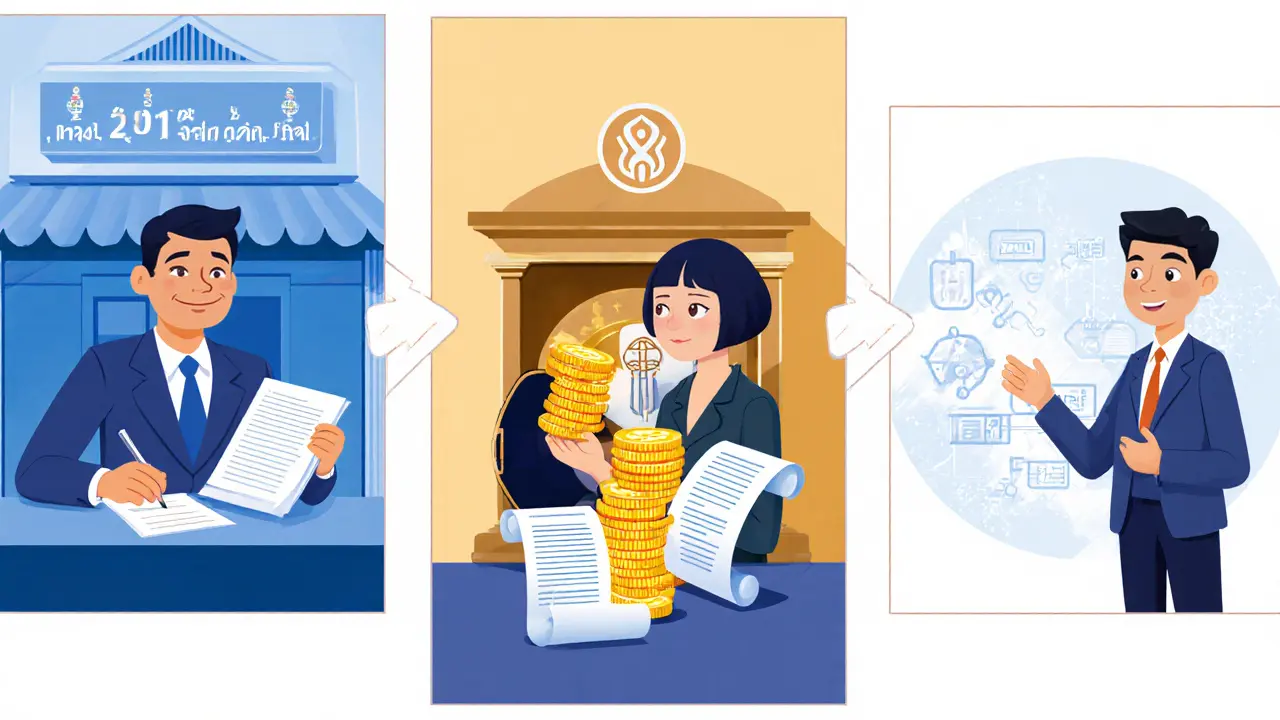
Thai Crypto Exchange License Calculator
Required Capital
50,000,000
THB
Application Fee
2,500,000
THB
Total Cost
52,500,000
THB
License Details
Activities
Order matching, market making, custody of user assets
Ongoing Obligations
- AML/CFT reporting
- Quarterly audits
- Cybersecurity audits
Key Requirements
- Thai legal entity required
- Thai resident director mandatory
- Full capital deposit in Thai bank
- AML/CFT policies required
Processing Time
Approximately 150 days for final approval after complete application submission.
TL;DR
- Capital: 50millionTHB (≈$1.4M) + 2.5millionTHB application fee.
- Three license types - Exchange, Broker, Dealer - each with distinct activities.
- Ministry of Finance issues the license; the SEC supervises compliance.
- Full application takes ~150days; preparation often needs 6‑12months.
- Foreign operators must meet the April2025 amendments and have a Thai legal entity.
When entering Thailand’s crypto market, Thai crypto exchange license is the official permission issued by the Ministry of Finance, supervised by the Securities and Exchange Commission (SEC), that allows a company to operate a digital asset exchange in Thailand. The framework, first introduced in 2018 and overhauled by the Royal Decree of 2025, blends strict investor protection with a clear path for legit operators. Below you’ll find everything you need to turn the regulatory maze into a step‑by‑step roadmap.
Regulatory Backbone: Who’s in Charge?
The Ministry of Finance acts as the primary licensing authority in Thailand. Once a license is granted, the Securities and Exchange Commission (SEC) provides ongoing supervision, conducts inspections, and enforces compliance. This two‑tier system mirrors traditional finance supervision, giving banks and institutional investors confidence to work with crypto firms.
Legal Foundations
The original Emergency Decree on Digital Asset Businesses B.E.2561 laid the groundwork for crypto regulation in Thailand in 2018. The most recent amendment, the Royal Decree on the Operation of Digital Asset Businesses (No2) B.E.2568 effective 13April2025, tightened rules for foreign providers and added clearer reporting standards. Together they define three main licensing categories:
- Digital Asset Exchange
- Digital Asset Broker
- Digital Asset Dealer
Each category has its own set of activities, capital thresholds, and fee structures.
License Types & Core Requirements
| Category | Primary Activities | Minimum Share Capital | Application Fee | Key Ongoing Obligations |
|---|---|---|---|---|
| Digital Asset Exchange | Order matching, market making, custody of user assets | 50millionTHB | 2.5millionTHB | AML/CFT reporting, quarterly audits, cybersecurity audits |
| Digital Asset Broker | Facilitating over‑the‑counter trades, acting as an intermediary | 30millionTHB | 1.8millionTHB | Monthly KYC updates, transaction monitoring |
| Digital Asset Dealer | Buying/selling digital assets for own account, no client custody | 20millionTHB | 1.2millionTHB | Annual AML audit, public disclosures of holdings |
All three categories share a common baseline: a share capital requirement must be fully paid into a Thai bank account before the license application is submitted. The capital acts as a financial guarantee for users and a buffer for regulatory enforcement.

Step‑by‑Step Application Process
- Incorporate a Thai legal entity. You need a locally registered company, a Thai office, and at least one Thai‑resident director.
- Deposit the required share capital. Transfer the full amount (e.g., 50millionTHB for an exchange) to a Thai bank and obtain a bank confirmation letter.
- Draft AML‑CFT policies. Include KYC procedures, transaction monitoring, and suspicious activity reporting workflows that meet SEC guidelines.
- Prepare technical documentation. Architecture diagrams, cybersecurity controls, data protection measures, and system resilience plans must be submitted.
- Assemble a compliance team. At least one Compliance Officer must hold a relevant certification and be resident in Thailand.
- Submit the application to the Ministry of Finance. Attach the business plan, financial projections, team CVs, and the application fee receipt.
- SEC review and sandbox testing. The SEC may request a sandbox trial or additional clarifications. Expect at least 150days from submission to decision.
Most applicants spend 6‑12months on pre‑application preparation because the documentation depth is comparable to a banking licence. Legal counsel and a local compliance partner can shave weeks off the timeline.
Ongoing Compliance After Licensure
Getting the licence is only the start. The SEC expects continuous adherence to several pillars:
- AML/CFT reporting. Monthly transaction summaries, annual risk assessments, and immediate filing of suspicious activity reports.
- KYC & customer due diligence. Real‑name verification, source‑of‑funds checks, and ongoing monitoring for high‑risk users.
- Cybersecurity standards. Annual penetration tests, ISO27001‑aligned controls, and a documented incident‑response plan.
- Financial reporting. Quarterly audited financial statements submitted to both the Ministry of Finance and the SEC.
- Regulatory updates. Stay current with any new SEC circulars, especially those covering DeFi or NFT marketplaces.
Non‑compliance can trigger fines up to 10% of monthly turnover or a revocation of the licence.
Special Considerations for Foreign Operators
The April2025 amendment closed a loophole that previously allowed offshore platforms to serve Thai users without a local licence. To qualify, foreign firms must:
- Register a Thai subsidiary or partnership with a Thai‑resident director.
- Appoint a local compliance officer approved by the SEC.
- Maintain a Thai‑based bank account for the required share capital.
- Demonstrate data‑localisation for user KYC records (stored within Thailand).
Failure to meet any of these points will result in a denial, even if the parent company holds a licence in another jurisdiction.
Common Pitfalls & Pro Tips
Pitfall #1: Under‑estimating capital. Many startups plan for the minimum 20millionTHB dealer capital and then discover they need exchange‑level funds for future upgrades. Secure a buffer of at least 15% above the required amount.
Pitfall #2: Incomplete technical docs. The SEC scrutinises system architecture. Use a certified third‑party auditor to validate your design before submission.
Pro tip: Leverage the SEC sandbox. If you’re unsure about a new product (e.g., DeFi staking), apply for sandbox participation. Successful pilots often fast‑track the full licence.
Pro tip: Build relationships with Thai banks early. Many banks are cautious about crypto clients. A bank that has already onboarded a licensed exchange (e.g., Kasikorn Bank) can act as a reference for your application.
Checklist Before You Submit
- Thai company incorporated and registered with the Ministry of Commerce.
- Share capital fully paid and bank‑certified.
- Comprehensive AML‑CFT policy signed off by a certified officer.
- Technical architecture diagram, cybersecurity audit report, and data‑storage plan.
- Business plan with 3‑year financial projections, including capital‑expenditure for IT.
- Team CVs proving relevant experience (exchange ops, compliance, IT security).
- Application fee receipt and proof of payment.
- For foreign firms: Thai subsidiary agreement and appointed local director.
Cross‑check each item against the SEC’s official checklist - the agency publishes a PDF that many applicants miss.

Frequently Asked Questions
How long does the licensing process take?
The Ministry of Finance usually issues a decision within 150days after a complete application, but most firms spend 6‑12months preparing the required documents before they even submit.
Can an existing foreign exchange operate in Thailand without a local licence?
No. The April2025 amendments require any platform offering services to Thai residents to obtain a Thai licence, regardless of where the parent company is based.
What is the minimum capital for a digital asset broker?
A broker must deposit at least 30millionTHB (about $850,000) in a Thai bank before the application is accepted.
Do I need a Thai‑resident director?
Yes. The Ministry of Finance requires at least one director who is a Thai resident for the incorporated entity.
What ongoing reporting does the SEC require?
Monthly AML transaction summaries, quarterly audited financial statements, annual cybersecurity audit results, and any material changes to the business model must be filed with the SEC.


Comments
Jack Fans
Wow, this guide is super helpful, especially the breakdown of capital requirements, application fees, and the step‑by‑step checklist, it really clears the fog that many newcomers face, the only thing I’d add is a quick note about tax implications for foreign investors, which can be a bit tricky, and maybe a reminder to keep an eye on the SEC’s monthly circulars, just in case they tweak the AML reporting standards again, good luck to everyone diving into the Thai market!
Adetoyese Oluyomi-Deji Olugunna
One must appreciate the meticulousness of the Thai regulatory apparatus; however, the prose here occasionally descends into pedestrian exposition – a more erudite articulation would have sufficed, albeit I note a few minor typographical slips such as "thre" instead of "three".
Krithika Natarajan
Thank you for the clear summary. The checklist is especially useful for anyone just starting out.
Ayaz Mudarris
Indeed, the formalism of the Ministry of Finance coupled with the SEC's oversight creates a robust environment; aspiring operators should therefore allocate sufficient time-approximately six to twelve months-for comprehensive preparation, ensuring all documentation aligns with the stringent regulatory expectations.
Irene Tien MD MSc
Oh, let me tell you, navigating the Thai crypto labyrinth is like trying to decode an ancient scroll written by a committee of bureaucrats who apparently think that making things complicated is a virtue. First, you have to wrestle with the capital requirement-50 million THB, which is roughly a small country’s GDP for a single startup. Then, you’re hit with the application fee, a whopping 2.5 million THB, just for the privilege of standing in line.
But wait, there’s more! You must set up a Thai‑legal entity, which means hiring at least one Thai‑resident director-good luck finding someone who speaks both English and the nuances of crypto compliance.
Don’t forget the mandatory AML/CFT policies, because apparently the SEC loves paperwork more than a novelist loves plot twists.
And just when you think you’ve covered all bases, the SEC will summon you for a sandbox test-think of it as a trial by fire where you must prove your system can survive a cyber‑attack while juggling user assets.
All of this, while the clock ticks toward that 150‑day decision window, which feels more like a deadline set by a deity of procrastination.
In short, if you’re not prepared to lose sleep, money, and perhaps a few hairs, you might want to reconsider. Or, you know, keep dreaming about hitting the moon while the Thai regulators keep you grounded.
kishan kumar
One must, perforce, contemplate the philosophical ramifications of such regulatory strictures; indeed, the imposition of capital thresholds serves as a quasi‑social contract, an ontological pact between state and market. 😊
Kevin Fellows
Sounds like a solid start, good luck!
Vaishnavi Singh
Appreciate the depth of detail here. The emphasis on a dedicated compliance officer and local bank account resonates with many of the challenges we’ve faced in similar jurisdictions.
Linda Welch
Oh sure, because nothing screams ‘innovation’ like waiting 150 days for a bureaucratic nod while your competitors are already trading. The whole thing feels like a grand comedy where the punchline is perpetual waiting. Meanwhile, you’re supposed to keep the lights on, pay salaries, and convince investors that the regulatory maze isn’t a death trap. And let’s not forget the delightful requirement for a Thai‑resident director-because apparently, a passport from anywhere else simply won’t do. All in all, it’s a masterpiece of red tape, and I’m just here for the popcorn.
Anthony R
Thank you, this is, as always, a thorough and meticulously compiled guide, it will certainly aid many aspiring operators, the inclusion of the step‑by‑step checklist is particularly valuable, and the emphasis on ongoing compliance is, indeed, essential.
meredith farmer
Honestly, I’ve always suspected that behind the façade of these regulatory announcements lies a deeper agenda-perhaps an orchestrated effort to centralize control over the crypto ecosystem. The timing of the 2025 amendments, coinciding with global market turbulence, feels far from coincidental. One must wonder who truly benefits from the stringent capital stipulations and the imposed local residency requirements. Is it genuine consumer protection, or a veneer for governmental oversight? Regardless, the narrative they’re pushing serves to keep the average participant in a state of perpetual uncertainty, which, in my view, is precisely the point.
Kyle Hidding
The jargon-laden compliance framework presented here is a classic example of regulatory bloat-over‑engineered protocols, hyper‑specific audit cycles, and a labyrinthine AML/CFT schema that essentially demands a dedicated compliance architecture before any viable product can launch. It’s a high‑frequency barrier to entry that favors incumbents and stifles genuine innovation.
Andrea Tan
Great overview! I especially like the tip about building relationships with Thai banks early. That can really smooth the capital deposit process.
Gaurav Gautam
Thanks for the detailed post. I’d add that joining local crypto meetups can also help you find a reliable Thai‑resident director and compliance partner.
Robert Eliason
Well, if you think the SEC’s sandbox is a blessing, think again-it's just a way to keep you in perpetual beta while they reap the data. Anyway, good luck.
Cody Harrington
I’ve been through a similar process and can confirm that the checklist is spot‑on. Just make sure you double‑check the bank certification letter; any discrepancy can delay the whole thing.
Chris Hayes
While the guide is comprehensive, I’d caution newcomers not to overlook the recurring cost of quarterly audits-they add up quickly and can strain cash flow.
victor white
One cannot help but marvel at the elegance of such a regulatory tapestry-each clause interwoven with the next, creating a symphony of compliance that, if performed correctly, yields a harmonious operation; yet, a single off‑note can bring the entire performance to a halt.
mark gray
Clear and concise-thanks for breaking it down in simple terms.
Alie Thompson
It is imperative that we, as a community, uphold the highest ethical standards when venturing into emerging financial territories; compromising on regulatory diligence not only endangers individual enterprises but also jeopardizes the broader societal trust in digital assets.
Samuel Wilson
Excellent work. I recommend reviewing the SEC’s latest circulars on DeFi, as they may impact future licensing considerations.
Rae Harris
Sure, the whole thing is just a big scam engineered to keep us in the dark, but hey, let’s keep using the jargon anyway.
Danny Locher
Thanks for the thorough guide! Stay positive and keep pushing forward-you’ve got this!